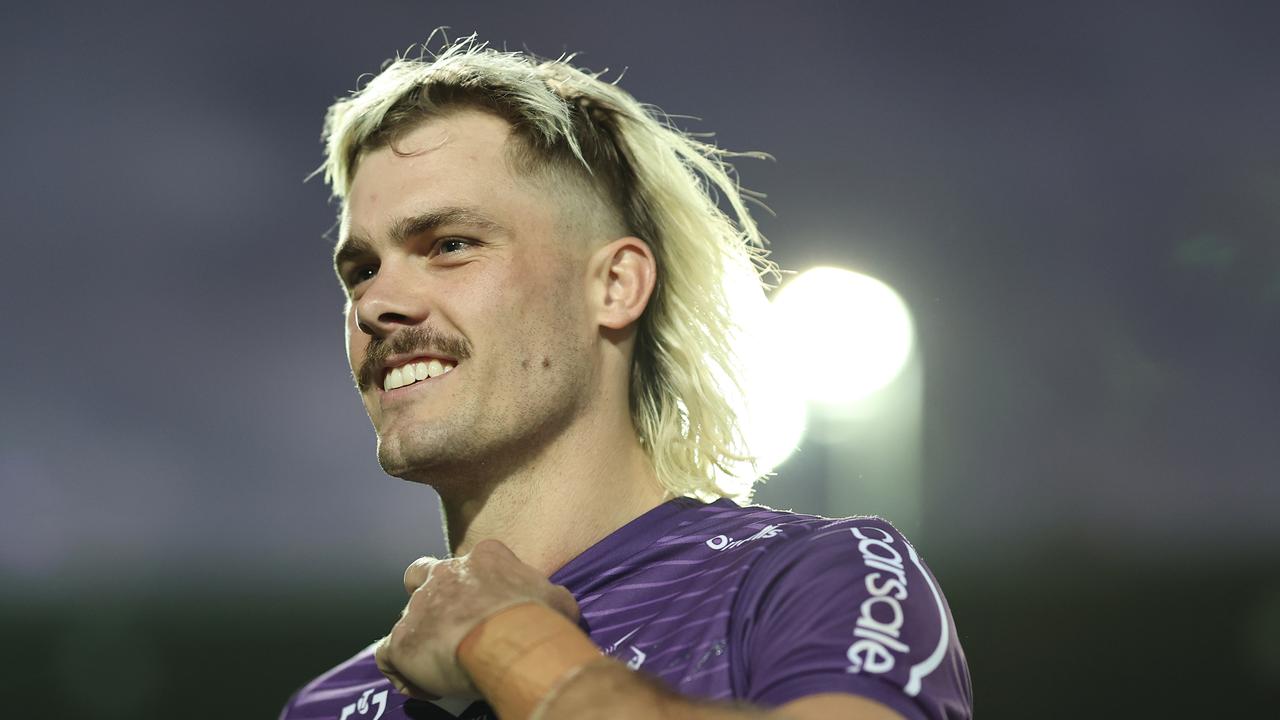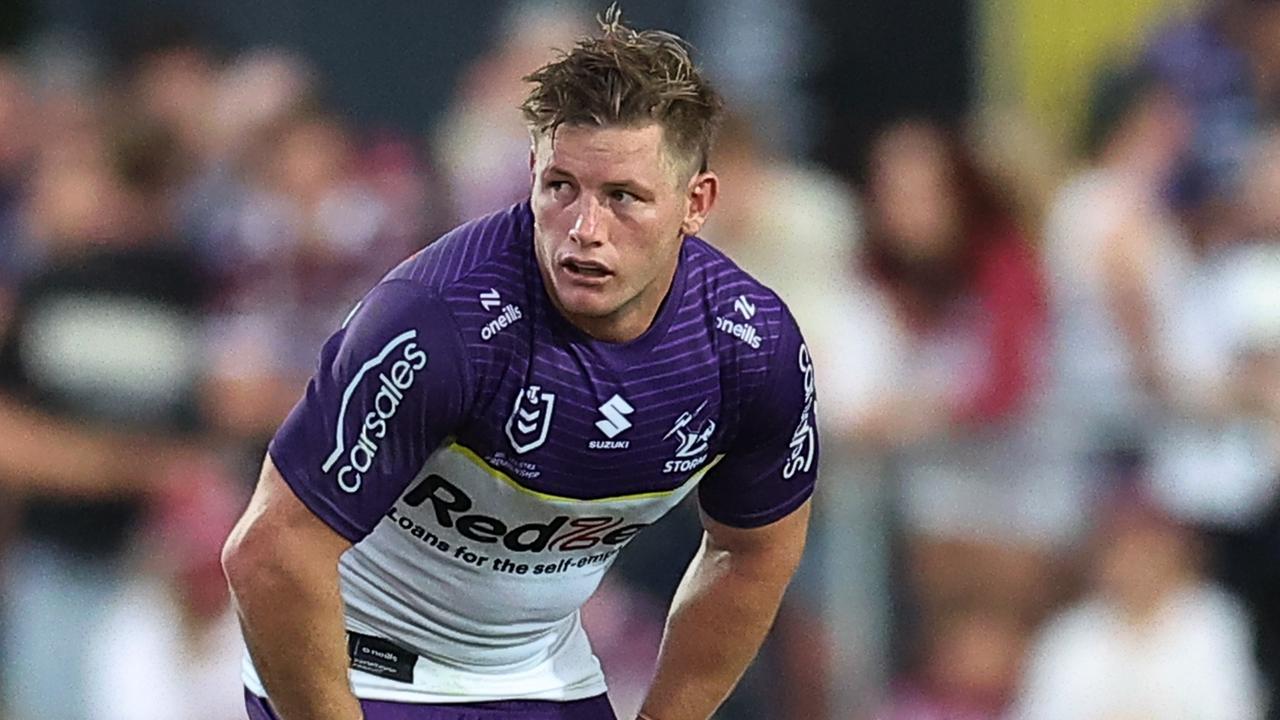NRL Physio’s casualty ward Round 3
Canterbury star Kieran Foran set for a long stint on the sidelines — plus latest on Burns, Garner, Cleary, Widdop, Moylan, Friend, Cronk, Inglis and more.
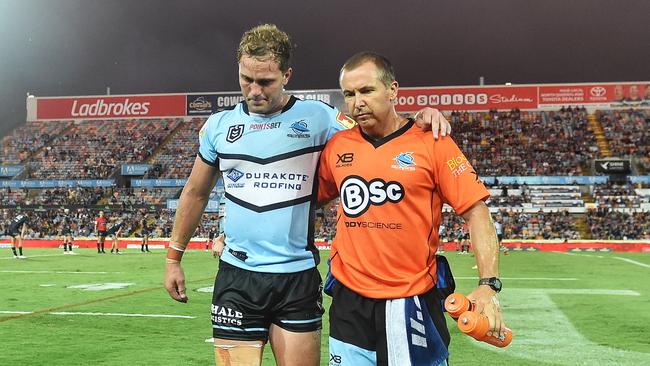
NRL
Don't miss out on the headlines from NRL. Followed categories will be added to My News.
NRL Physio, aka Brien Seeney, gives his expert analysis of all the Round 3 injuries.
***
Canterbury’s NRL season has suffered a major setback with five-eighth Kieran Foran set to be ruled out for 10-12 weeks.
Foran has been diagnosed with an ankle syndesmosis injury and is expected to undergo surgery, according to Fox Sports’ James Hooper.
It’s another blow for the 28-year-old New Zealander who has battled injury and personal problems in recent years but produced a man of the match performance in the weekend win over West Tigers.
Captured this video on Sunday as was concerned for syndesmosis injury for Kieran Foran. He was able to finish the game, but he will now require surgery & a likely 8-10 week recovery. Can see Foran’s right yellow boot below get turned out after heavy contact from tackler below pic.twitter.com/2VRqa9nP5H
— NRL PHYSIO (@nrlphysio) April 2, 2019
Matt Moylan is out for six weeks with a hamstring injury. Hamstring injuries accounted for the second most missed games in NRL last season (behind ACL injuries), with rehab being quite challenging amid a notoriously high re-injury rate (10-30%).
A general recovery time for the different severities of hamstring injury is:
Grade 1: 2-4 weeks
Grade 2: 4-6 weeks
Grade 3: 6-10 weeks
Adding more concern to the situation, Moylan has quite this history with hamstring issues. Similar to that identified with Tevita Pangai Jr earlier this season, Moylan has had multiple stints on the sideline over the past two seasons caused by hamstring strains:
July 2017: Left hamstring injury, missed 1 week. First game back: re-injured left hamstring, missed two weeks
August 2017: Right hamstring injury, missed at least two weeks before taking personal leave
March 2018: Hamstring injury (unknown side), missed 2 weeks
March 2019: Left hamstring injury, recovery time TBA
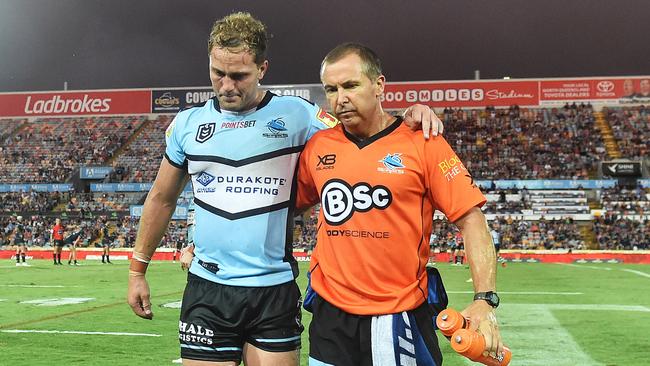
Braidon Burns has been cleared of a fracture in his ankle, but is still likely to be sidelined for up to a month with a hamstring injury suffered in Sunday night’s win over Gold Coast.
It leaves the Rabbitohs in a vulnerable position given skipper Greg Inglis is no certainty to return from his shoulder injury this Saturday against Manly.
Inglis will be given every opportunity to prove his fitness but if ruled out, talented outside back Jacob Gagan is likely to get his call up.
Gagan is 26 and has only played eight NRL games at previous clubs Cronulla and Newcastle, but Wayne Bennett has been impressed by his form in reserve grade and has a rap on his ability.
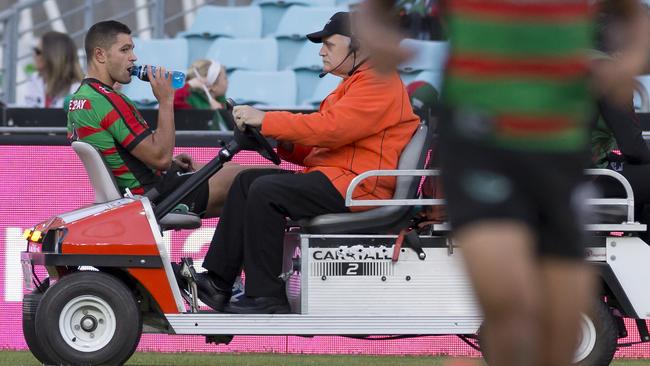
The Rabbitohs will be out to continue their unbeaten run after joining Melbourne at the top of the NRL ladder as the only sides to remain undefeated.
Burns’ injury is a rotten setback after his terrific start to the season.
The youngster captured the hearts of everyone in the game last week when he revealed his amazing against-the-odds life story that led to him becoming an NRL player.
— Paul Crawley
Video unclear on Braidon Burns left leg injury. Yet to see a replay with better angle. Doubt he will be back with cart needed to take him from field. Really hope injury didn’t occur during non-contact step off left foot right before he was tackled #NRLSouthsTitans pic.twitter.com/2CiINJzEew
— NRL PHYSIO (@nrlphysio) March 31, 2019
Benji Marshall also failed to finish with a hamstring injury. Marshall was said to only be suffering “hamstring tightness” by coach Michael McGuire, but it was a new injury he didn’t carry into the game. Regardless of severity, it is always difficult to return the very next week even after suffering a minor hamstring injury.
Nathan Cleary relinquished the goalkicking duties to James Maloney on Saturday night, and it was revealed this was due to a minor groin niggle Cleary carried into the game. Groin issues are notorious for lingering and are particularly aggravated by kicking motions. Cleary is hoping to take the kicking duties back next week, but with such a capable replacement in Maloney it wouldn’t be surprising for the Panthers to be cautious with a switch back.
Luke Garner missed a significant portion of the Tigers game after suffering an AC joint injury. It is common for NRL players to play through minor AC joint sprains with pain relief. Often a pain killing injection will be used back in the sheds to control the pain and allow a player to return to the field. It will still be something to keep an eye on throughout the week; as the injury settles over the next few days it can become more limiting and painful. Josh Mansour recently suffered a low grade AC joint sprain and was able to finish the game, however missed the following week.
By video concern for Luke Garner is AC joint (tip of shoulder) injury. Hope no fracture present. Can often play through minor grade injury but more severe injury would make it unlikely he returns.
— NRL PHYSIO (@nrlphysio) March 31, 2019
General recovery guide:
Gr 1: 0-2wks (0wks being a return today)
Gr 2: 2-4 wks pic.twitter.com/RLOOrYr36W
St George Illawarra captain Gareth Widdop suffered a right shoulder dislocation in the closing stages of Thursday night’s win over the Broncos.
This was Widdop’s third right shoulder dislocation in the past eight months, having undergone a shoulder reconstruction after two dislocations at the end of last season.
Widdop spent five months over the off-season in rehab after surgery, strengthening his shoulder in an effort to regain full function and decrease the risk of a re-dislocation.
Unfortunately three NRL games into his return the feared re-dislocation has occurred, which almost always brings further damage to structures in the shoulder joint.
With shoulder dislocations there are two main treatment options: conservative rehab or shoulder reconstruction surgery. Many factors influence this treatment decision, with two of the most important being the severity of damage to the shoulder and the overall stability of the shoulder joint post dislocation.
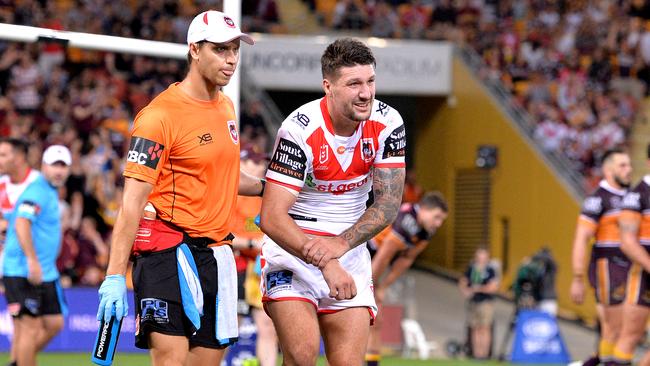
A general guide for recovery is:
— If there is minimal damage to the shoulder joint and surrounding structures, and the medical staff are optimistic they can regain stability in the shoulder joint, strengthening rehab can be trialled for three to six weeks before a possible return. In these cases surgery may still be required, but is often delayed until the off-season (think Widdop and Anthony Milford last year)
— If there is significant damage to the shoulder joint and surrounding structures, and the risk of significant instability/recurrent dislocation is quite high, shoulder reconstruction surgery will be performed which usually requires 3-6 months recovery
At this early stage of the season it makes the treatment decision all the more difficult for Widdop and the medical staff. I’m sure this isn’t the way Widdop wants his NRL career to end, and he could opt for conservative rehab in hopes of returning in three to six weeks. However this would come with an increased risk of another dislocation, and possible further or long-term damage to structures within the shoulder joint.
It certainly is concerning how easily the shoulder appeared to dislocate this time round, with Widdop just sliding to regather a ball on the turf. A re-dislocation only three games into his return from shoulder reconstruction surgery and 5 months rehab is very unfortunate, with the main goal of this surgical and rehab process being to decrease the likelihood of recurrent shoulder dislocations. This increases the likelihood of immediate surgery.
While Widdop will likely require further surgery at some stage, whether this happens immediately or is delayed will likely be decided in the coming days.
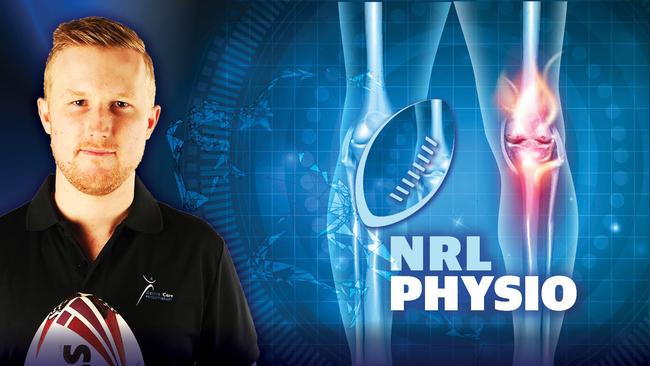
Nathan Peats suffered a pectoral tear during a weights session after training on Thursday. Peats said he had felt some tightness in his pec after the Titans’ Round 2 game, thought little of it at the time and then had the injury occur while doing bench press. Bench press is an exercise that places strain on the pecs.
If you had wondered why some NRL players may miss a week or two throughout the season citing “hamstring tightness” or “muscle soreness”, this is one of the risks they are trying to avoid. Medical and strength and conditioning staff will always want to know if players are suffering symptoms of muscle soreness and/or tightness, as it can point to an increased risk of further injury to that particular muscle group in the near future. Training and game load can then be managed to reduce the risk of further injury.
Disappointed to be missing footy after such a tough pre season and two games. Had a tight pec from last weeks game and didn’t think much of it and done bench press and felt a pop. Just typical Nathan always trying to be better and not listening to his head. Such is life
— Nathan Peats (@nathanpeats9) March 29, 2019
In somewhat good news for Peats his pec injury is thought to only be a partial tear, and not a complete rupture. If this is confirmed by scans his chance of avoiding surgery improves. Some partial tears still do require surgery if the risk is too high that a complete rupture will occur in the future. This would result in the usual 10-14 week recovery period for pec ruptures that require surgery, which Peats will obviously be hoping to avoid. If as hoped Peats does not require surgery and can undertake a rehab program the Eels are expecting he could be back in six weeks. Michael Gordon is a great recent example of this; in 2017 he narrowly avoided pec surgery after suffering a partial tear and returned after six weeks of rehab.
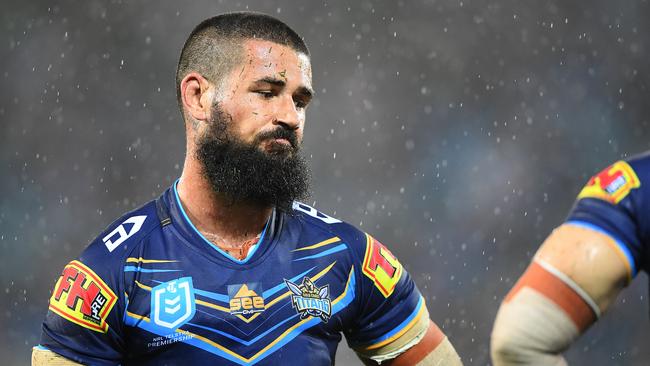
Jake Friend did not return to the Roosters game on Friday night having re-aggravated a shoulder issue that kept him out of their Round 2 game.
He left the field of play holding his left arm heavily, which had many thinking he may have dislocated his shoulder or torn a shoulder/arm muscle.
On closer viewing it appeared Friend had in fact suffered a compression stinger/burner; an injury where the nerves that run from the neck down into the arm get significantly pinched.
The video replay showed a blow to his head during the tackle that caused his head to lurch violently towards his left shoulder. This can cause symptoms such as pain, weakness, pins and needles and numbness to run down into the arm; hence Friend’s natural reaction to quickly clutch at his left arm.
Stingers/burners are considered a neck/shoulder issue, as the source of pain is injury to the nerves that run through both of these areas. They have a high recurrence rate in contact sports (>30%), and considering Friend had already been dealing with some recent sensitivity in these nerves this likely left him at an increased risk of re-injury.
Most stinger/burner injuries resolve very quickly, with many players returning to play in the same game and at worst able to play the following week. However recovery from recurrent nerve injuries like Friend’s can be a bit harder to predict than other muscle and bone injuries, and it looks very likely he will have to spend some time on the sidelines. The most important predicting factor of return to play in these cases is the presence of any neurological symptoms. Most NRL players will be able to return in 2-4 weeks once any weakness/numbness/pain has settled, and provided there is no permanent damage to the nerves it is very unlikely to result in a long-term absence (more than six weeks).
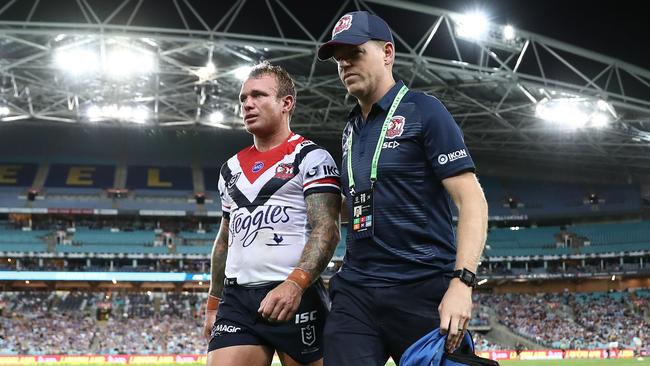
Jared Waerea-Hargreaves and Paul Gallen both failed to finish their respective games after suffering rib cartilage injuries. The rib cage as a whole is very elastic; it has a lot of recoil if you take a blow to the ribs. Unfortunately with the high-velocity collisions in the NRL sometimes there’s only so much the ribs can take, and something has to give way or break.
Rib cartilage injuries are known as one of the most painful injuries a person can suffer, particularly a contact sport athlete. Every twist and turn can cause sharp pain, with a cough or a sneeze another level entirely. Unfortunately there’s not much in the way of treatment except pain relief and time.
When trying to return to rugby league in these cases, any twisting motions can be very difficult. This makes tackling and wrestling difficult, and obviously if player takes another blow to the ribs this can easily aggravate their pain.
Luckily for these two workhorse forwards if they are able to avoid a rib cartilage fracture (three to six weeks) the recovery time is usually quite short (one to three weeks). The injury becomes mostly a pain tolerance issue, with the use of painkilling injections being quite common in these cases.
Even after returning it can still take two to three months for the issue to settle completely, with many NRL players continuing to play through pain during this time.
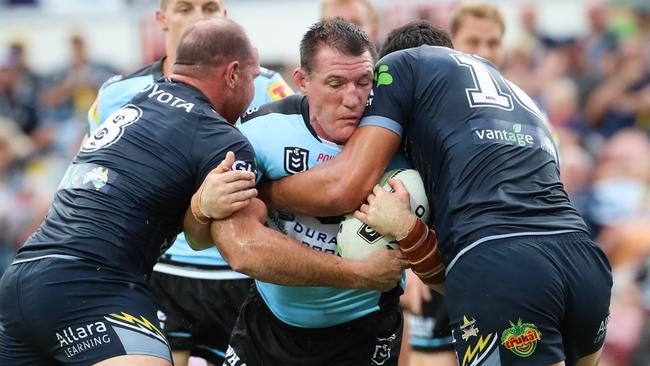
Issac Luke failed to return to the field after half-time as he was suffering from “hamstring tightness”. As discussed above, hamstring injuries are notorious for causing lingering issues and even the most minor strains usually require two weeks to return to play. Luke will be against the odds to return in Round 4 for the Warriors considering they only have a six-day turnaround before facing the Titans on Friday night.
Cooper Cronk was also held out again this week as he continues to deal with hamstring tightness in another example of clubs being conservative with a return from hamstring injuries this early in the season.
Greg Inglis has been ruled out of the Rabbitohs’ Round 3 game as his shoulder soreness has not settled after being caught in an awkward tackle last week. Coach Wayne Bennett said it was possible Inglis misses next week too, but the good news was scans showed no further damage. The suggestion has been that Inglis is just suffering from general soreness and impingement (pinched structures) in his shoulder; issues that he has been playing through since midway through last season. This means that while he may have a quick return to play, he will likely be at slightly increased risk of a recurrence of these symptoms throughout the 2019 season. Add this to the knee issue Inglis is reportedly managing and he has a challenging few months ahead to try and regain top fitness.
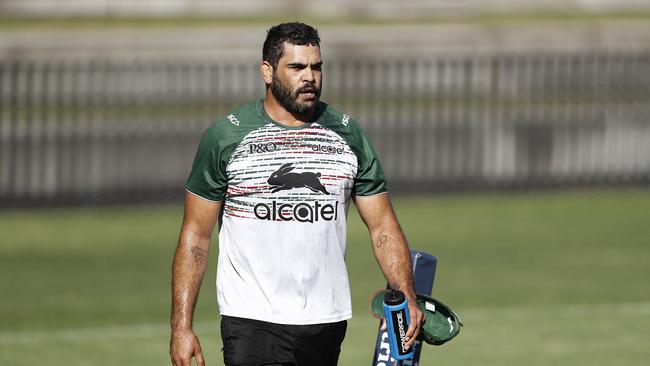
Wackos Whispers reports that Kyle Feldt is expected to return for the Cowboys in Round 5-7. This would be a six to eight- week recovery after he suffered a groin strain in the final week of preseason. This recovery timeline fits a mid/high grade adductor (groin muscle) injury, with the possibility that the injury is to the tendon insertion into the pelvic bone. Tendon injuries often require a longer recovery compared to muscles, with healing times slower due to lesser blood supply and a more challenging rehab process.
Connor Watson missed Round 3 with a minor MCL injury he suffered last week. While Watson was able to play out the Round 2 game heavily strapped, after scans this week the Knights decided it was best he take some time off to recover. They are hopeful of having Watson back next week, with most grade 1 MCL sprains requiring one to three weeks for recovery.
Tepai Moeroa was ruled out of the Eels game after suffering a calf injury in the warm up. The early hopes are that it is not a severe tear, with the general recovery times for mild-moderate calf strains being:
Grade 1: 1-3 weeks
Grade 2: 3-6 weeks
Aidan Sezer was ruled out of Round 3 for the Raiders with an oblique injury (side strain). The Raiders are hoping for a return in one to two weeks, which suggests a minor strain. The usual recovery time for low grade side strains is one to four weeks.
FULL NRL CASUALTY WARD
BRONCOS
James Roberts (Achilles, Round 5)
Payne Haas (Disciplinary, Round 5)
Matt Lodge (Suspension, Round 4)
BULLDOGS
Kieran Foran (Ankle, TBC)
Fa’amanu Brown (Leg, Round 4)
Renouf To’omaga (Hamstring, Round 5)
Brandon Wakeham (Ankle, indefinite)
COWBOYS
Jason Taumalolo (Knee, Round 8-12)
Kyle Feldt (Groin, Round 5-7)
Murray Taulagi (Knee, TBC)
Scott Bolton (Suspension, Round 6)
DRAGONS
Gareth Widdop (Shoulder, TBC)
Jack de Belin (Stood down, Indefinite)
Tyson Frizell (Testicle, Indefinite)
Darren Nicholls (Scapula, Round 7)
EELS
Tepai Moeroa (Calf, TBC)
Nathan Brown (Pectoral, Round 14)
Will Smith (Broken arm, Round 8)
George Jennings (Knee, Round 4)
Kaysa Pritchard (Personal leave, Indefinite)
Manu Ma’u (Knee, Round 6)
KNIGHTS
Connor Watson (Knee, Round 4-5)
Slade Griffin (Knee, Indefinite)
Nathan Ross (Finger, Round 5)
Jacob Saifiti (Leg, Indefinite)
Daniel Saifiti (Knee/foot, Round 6)
Pasami Saulo (Hand, Round 5)
PANTHERS
Sam McKendry (Knee, Indefinite)
Viliame Kikau (Knee, Round 4)
Tyrone May (Stood Down, Indefinite)
Nathan Cleary (Groin, Round 4)
Isaah Yeo (Concussion, TBC)
RABBITOHS
Greg Inglis (Shoulder, Round 4-5)
Adam Doueihi (Knee, Round 4-5)
George Burgess (Suspension, Round 4)
Liam Knight (Suspension, Round 5)
Braidon Burns (Hamstring, Round 8)
RAIDERS
Aidan Sezer (Oblique, TBC)
Joseph Tapine (Thumb, Round 4-5)
Michael Oldfield (Groin, Round 4)
ROOSTERS
Jake Friend (Shoulder, Round 6)
Jared Waerea-Hargreaves (Rib, TBC)
Brett Morris (Knee, Round 5-6)
Cooper Cronk (Hamstring, Round 4)
Ryan Hall (Knee, Round 8)
Lindsay Collins (Concussion, Round 4)
SHARKS
Matt Moylan (Hamstring, Round 10)
Paul Gallen (Rib, TBC)
Wade Graham (Knee, Round 9-12)
Ava Seumanufagai (PCL, Round 4)
SEA EAGLES
Taniela Paseka (Knee, Round 3)
Albert Hopoate (Knee, TBC)
Dylan Walker (Stood down, Indefininte)
STORM
Scott Drinkwater (Pectoral, Round 8-12)
Tom Eisenhuth (Throat, Indefinite)
Joe Stimson (Back, Round 4)
TIGERS
Benji Marshall (Hamstring, TBC)
Luke Garner (Shoulder, TBC)
Chris Lawrence (Broken jaw, TBC)
David Nofaluma (Shoulder, Round 4)
Jacob Liddle (Ankle, Round 6)
TITANS
Nathan Peats (Pectoral, TBC)
Ash Taylor (Quad, Round 4)
Tyrone Roberts (Achilles, Round 4-5)
Jack Stockwell (Hip, Round 3)
Dale Copley (Calf, Round 4)
WARRIORS
Issac Luke (Hamstring, TBC)
Nathaniel Roache (Calf, Round 4)

